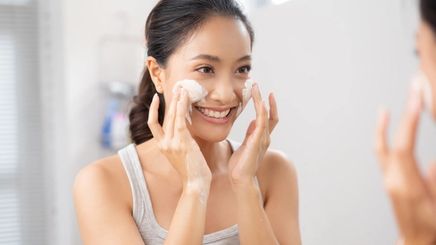
Good old bar soap is a household staple for many reasons: it cleans quickly, washes off easily, and is usually and highly disinfecting. However – for the very same reasons – you wouldn’t want it anywhere near your face especially if you have . Proper care for this skin issue is more than just getting rid of oil or at least the feeling of being oily. Here's why you need to stop using soap for and .
What’s Soap, Anyway?
When you choose over soap at the drugstore aisle, you’re not just choosing a product that lathers over one that doesn’t.
The standard bar soap is a surfactant. It is a compound that can act as a detergent, foaming agent, emulsifier, among others. A cleansing agent used for the skin and other surfaces, soap is a chemical reaction between an alkali metal and a fatty acid. It cleans by separating oil particles from the water and rinsing them away. Here’s why it’s not so great for your skin.
It can weaken the skin barrier.
By its very nature, soap is alkaline-based. Skin, on the other hand, is acidic. Ideally, the skin should maintain a pH of 4 to 6.5 – even if it’s oily. The skin barrier needs this acidity to keep moisture in and bacteria out. Maintaining this balance is essential. If the skin is too alkaline, it can get . If it’s too acidic, you’re likely to develop acne.
Using bar soap on your skin can challenge the skin barrier; frequent use of soap will eventually weaken it. That squeaky clean feeling that it leaves may be awesome for someone who deals with oil all the time, but it’s not a good sign.
It can make your skin produce more oil.
That tight, dry feeling you get after washing your face with soap doesn’t last long. You may notice that your skin gets shinier a lot sooner, and you may even feel your skin . The drying effect of soap occurs with it strips the skin of its natural oils – which are not the enemy, but exist to protect it.
Without these oils, the skin becomes more susceptible to roughness, itching, and irritation. It can also trick your sebaceous glands into producing more sebum, leading to an excessive amount that can .
It Can Trigger Breakouts
All that extra sebum can mix with dirt, bacteria, and dead skin cells found on the surface of the skin. This buildup can and cause acne breakouts like whiteheads, blackheads, and pimples. Stop using a random soap for pimples and oily skin. Instead, choose a product specifically formulated for . The best anti-acne face cleanser has nothing on soap.
A facial wash like POND'S Bright Miracle Ultimate Acne Control Facial Foam promotes smooth, clear skin by getting rid of impurities, excess oil, and acne-causing bacteria. It gets to the root of acne rather than just superficially making your skin feel less oily.
You could also try POND's Aloe Vera Jelly Cleanser, an oil-free jelly formula that deeply nourishes and with soothing aloe vera. And it does this without adding any more oil to your pores.
As a general rule, it's best to use products that are created for your skin type, instead of using soap for pimples and oily skin. This can help address your issues without compromising your overall skin health.
Facial wash does not only help mitigate sebum-related skin issues. Read our article on .